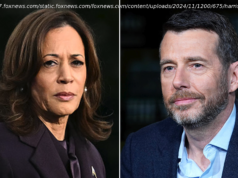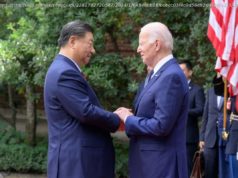Donald Trump’s trip to Asia may offer him a much-desired break from the turmoil engulfing his White House. And for a president who has always gotten along better with autocratic leaders than democratically elected ones, Trump is headed to the right place.
Donald Trump’s trip to Asia may offer him some much-desired respite from the turmoil engulfing his White House. And for a president who has always gotten along better with autocratic leaders than democratically elected ones, he’s headed to the right place.
Trump will visit China and Vietnam, one-party states governed by the Communist Party, and the Philippines, where brutal strongman Rodrigo Duterte stands as president.
A senior administration official went as far as to say that Trump had “warm rapport” with Duterte and looked forward to meeting him in person for the first time.
Trump, a third-generation businessman with a real estate empire, touts his ability to negotiate a deal no matter who’s on the other side. But facing off against leaders whose words serve as dictates in their own nations helps.
“The main appeal is simply that Trump was a business autocrat and he doesn’t really understand how to deal with more complex democratic systems,” said Wayne White, who served as senior State Department intelligence official for the Near East and South Asia under former President George W. Bush. “You shake hands over a business deal and the suits work it out. And that’s the way business is done.”
Trump will visit five countries over 12 days, starting Friday. He’ll be feted at a pair of state visits in China and South Korea complete with festive ceremonies and lavish meals. Much of his time will be spent talking about the North Korea nuclear threat and trade. The trip may well generate positive headlines, but it doesn’t mean he will succeed in getting policy changes unless he pushes the countries, such as China, hard, something he has been reluctant to do.
Trump won office with no political experience by touting an America First agenda in which the United States shuns globalization and embraces nationalism — a stance his supporters still back 10 months later.
He made it clear he would not be the “president of the world” and criticized organizations designed to ensure nations worked together. He called NATO obsolete, predicted the demise of the European Union and ridiculed the United Nations as an inefficient and inconsequential body.
Trumps shares some of the ideals of autocratic leaders and has voiced admiration for their strength. Past U. S. presidents have worked with some of those leaders in countries such as Saudi Arabia and China but would push them on their poor human rights records . Trump has declined to vocally raise human rights issues at these meetings.
For instance, he congratulated Turkish President Recep Tayyip Erdogan for his victory in a referendum that increased his power, even after thousands of political opponents were arrested. He praised Egyptian President Abdel-Fatah el-Sissi, a former general who helped push out democratically elected president, Mohamed Morsi. And he has expressed admiration for President Vladimir Putin even as he learned Russia meddled in the 2016 presidential election.
“They are all leaders that tried to go around the traditional elite to the masses,” said Elizabeth Economy, director for Asia studies at the Council on Foreign Relations.
National Security Adviser H. R. McMaster defended Trump against criticism that he is soft with certain autocratic leaders by avoiding contentious issues of democracy and human rights.
“I think what the president is focused on is being effective on advancing and protecting human rights and advancing the rule of law,” McMaster said. “We’ve seen him do it quietly in every relationship. So how much does it help to yell about these problems? It hasn’t really delivered in recent history anyway.”
Trump has condemned U. S. adversaries such as Syria and Venezuela and Cuba on human rights grounds but not the Philippines, Turkey and Russia.
At the same time, Trump has feuded with leaders of Germany, Australia and Mexico, many who have publicly criticized him for pulling out the Paris climate agreement, turning his back on immigrants and choosing not to certify that Iran was complying with all terms of the agreement.
“That does suggest to me though that the focus of the president’s attention frankly, is much more on the, the Middle East and on, and on Asia and the Pacific, then it is on Europe,” said Jonathan D. Pollack, senior fellow in the John L. Thornton China Center and Center for East Asia Policy at the Brookings Institution.
Trump embraced Middle Eastern leaders on a trip to Saudi Arabia earlier this year, but clashed with European leaders as he visited multiple countries.
He didn’t repeat his earlier description of the Belgian capital as a “hellhole,” but the contrast between Trump’s warm embrace of Saudi autocrats and his awkward interaction with the democratically elected European leaders was easy to see. He was more welcomed by the Muslims he’d proposed barring from the United States than by allies in Europe whose priorities and values have long been parallel with U. S. ideals.
In Saudi Arabia, al Sisi praised Trump as someone “capable of doing the impossible,” where Trump addressed more than 50 leaders of Muslim nations. He danced with Saudi royalty, then later struck a multi-billion dollar arms deal with them.
In Europe, Trump sparred with leaders about climate change and engaged in a not-so-warm handshake competition with French President Emmanuel Macron. He lectured them about defense spending and refused to go along with their statement supporting the Paris agreement.
James Jeffrey, who served as U. S. ambassador to Iraq and Turkey and deputy national security adviser in the George W. Bush administration, said Trump told the Saudis what they wanted to hear, which garnered positive headlines.
The European allies, on the other hand, had their own political motivations. German Chancellor Angela Merkel was entering an election while Macron had just come out of one.






